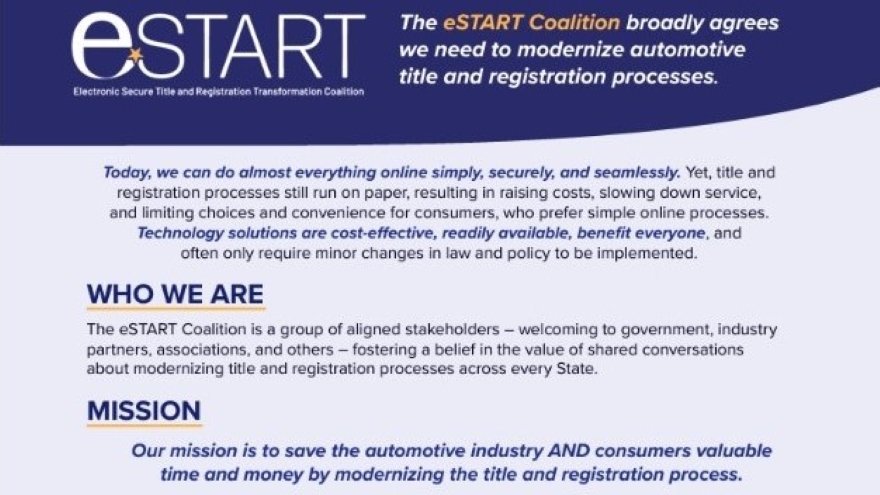eSTART’s rapid growth shows industry’s interest in modernizing titling

Image courtesy of eSTART.
By subscribing, you agree to receive communications from Auto Remarketing and our partners in accordance with our Privacy Policy. We may share your information with select partners and sponsors who may contact you about their products and services. You may unsubscribe at any time.
eSTART is off to a fast start.
The eSTART Coalition, an organization seeking to modernize title and registration processes across the country by facilitating advocacy for state and local governments to adopt electronic options, announced its launch in March with 18 founding members, including the National Automobile Dealers Association, Carvana, DocuSign, IAA and ACERTUS.
Five months later, the group is up to 91 members with the addition of PDP Group, a provider of web-based electronic lien and title processing systems, as the latest step in eSTART’s “countdown to 100.”
According to eSTART’s LinkedIn page, other organizations to join in recent weeks include the National Independent Automobile Dealers Association, the National Independent Vehicle Title Agents organization, Copart, OPENLANE and CarMax.
“Am I surprised where we’re at?” Carvana head of policy, title and registration modernization Tony Hall said. “In a way, yes. I think most of us are surprised at the speed, but then also part of me says I shouldn’t be surprised just because of how big the automotive industry is, and titles being ownership of those cars is a huge, huge part of that.”

Tony Hall
Hall said the swift growth of eSTART — an acronym for Electronic Secure Title and Registration Transformation — is a result of the fact most states still rely on paper titles to define vehicle ownership.
Subscribe to Auto Remarketing to stay informed and stay ahead.
By subscribing, you agree to receive communications from Auto Remarketing and our partners in accordance with our Privacy Policy. We may share your information with select partners and sponsors who may contact you about their products and services. You may unsubscribe at any time.
“So many people care about ownership of a vehicle primarily being driven by this single piece of paper,” he said, “when so much of the auto industry is moving online or have digital services that, but so many parts of the process still require making sure this piece of paper is following the car along the process.
“It’s a single-source document, issued by a state regulator, and that’s the ownership of the car. And if you lose that piece of paper, it’s not like you just go back online and reprint out a new one. There’s a process you’ve got to go through, and it’s a painful process.”
Making the titling process less painful is eSTART’s aim, but the organization itself does not actually take any specific policy positions or advocate for anything, Hall said. What it does is provide a clearinghouse to share news and information about what is happening in the titling and registration space and to amplify the voice of its members’ advocacy.
“It’s people who are interested and aligned on the general premise of we need to move forward,” he explained. “eSTART facilitates a place to have that conversation among people who want to move the space forward.”
For example, when a coalition member writes a letter or petition to a state legislature, governor or regulatory agency in support of a bill or policy, or seeking guidance on a titling issue, it’s presented to eSTART’s membership. Those members who agree can then sign on to the letter to show the idea has wide industry support rather than just the backing of single stakeholder.
The letter comes from the signers, not from eSTART itself. Those letters and petitions can be found on eSTART’s efforts page.
“I think that’s part of the reason why eSTART has attracted as many people as it has is eSTART isn’t trying to represent everybody’s opinion or position,” Hall said. “So they can pick and choose what they agree with and they can sign on as their own company versus having to worry about, ‘Do I want to have eSTART speak for me on this when I might not align with 10% or 20% or 50% of what they’re advocating for?’ You also avoid some of the muddiness of who makes the decisions on what’s being spoken about.”
At just five months old, the coalition’s work is just beginning, and there is a long, long way to go.
Hall said just four to six states currently have completely electronic titling systems in place, “depending on how you measure.” He cited West Virginia as having “probably the most comprehensive e-titling solution right now,” while several states limit e-titling to single-vehicle owners or dealers or vehicles with clean titles, among other restrictions.
“There are a few states that have some isolated pockets of what you could term as e-titling,” he said. “The challenge is it’s very limited in scope, and nothing exists across state lines. … So even if a state has some component of e-titling, as soon as you’re crossing a state line, you’ve got to have a piece of paper to follow it.”
That said, there is plenty of interest from the auto industry in the issue.
“I feel like there’s probably been more conversation around the broad terminology of e-titling or modernizing the title and registration space in general in the past two or 2½ half years, as I’ve probably seen in the prior 10 or 12 years combined,” Hall said. “There’s just a general interest in that. I think DMVs have been lagging, and DMVs have even started taking a lot of interest.
“And then there have been some new entrants into the space that are offering some pretty innovative approaches and solutions. And that’s also driving the progress, or really more the conversation and the momentum of the conversation more than actual tangible progress.”
More information about eSTART is available at estartcoalition.org.


